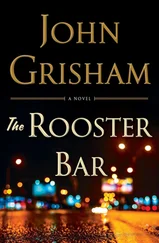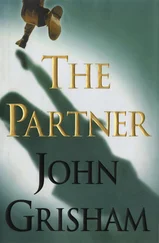In his car, Tabor called Jeri but got her voicemail. He went to a coffee shop, and as he killed time he took photos of the four sheets of paper and sent them to her. After his third cup, she finally called. He described what he had found and what the other files looked like. It was obvious that Verno’s had been doctored.
“This officer, N. Ozment, is he still around?” she asked.
“No. I’ve already checked.”
“And no other names in the file? Just Verno and Ozment?”
“That’s all.”
“Well, that makes the next step easier. See if you can find Mr. N. Ozment.”
Jeri was in her office on campus, her door open so any student could pop in for a chat, but she was alone as she crunched on a light salad and sipped a diet soda. Eating was difficult with her stomach flipping the way it always did when someone she was paying $150 an hour was on the job with no idea how long the job might take. There was also the excitement of finding paperwork that had been tampered with. She reminded herself that she did not yet know if the Lanny Verno she was tracking in Pensacola was also the one who had been murdered in Biloxi, and she admitted that the odds were long. There were ninety-eight Lanny Vernos in the country.
However, the facts might be tilting in her favor. As an esteemed member of the judiciary, Judge Bannick would certainly have easy access to old court files and evidence. He would be respected by the police. As an elected official, he would need their support every four years. He would be able to come and go through their many protocols and procedures.
Lanny Verno, a house painter, pulling a gun on Ross Bannick, a hotshot lawyer, thirteen years ago? And winning the case?
As always, she scanned several newspapers as she ate lunch. Same for breakfast and dinner. She found an interesting item in the Tallahassee Democrat. At the bottom of page 6 in the State section there was a recap of government news. The last item was a less than urgent announcement that Lacy Stoltz had been appointed as the interim director of the Board on Judicial Conduct, replacing Charlotte Baskin, who had been nominated by the Governor to run the Gaming Commission.
Clawing her way up the ladder, and moving from office to office, Cleo had learned to pack lightly and never fill the drawers or decorate the walls. Without a word to anyone, though the gossip was raging, she packed her things and left the building. The gossip did not follow her but instead turned to Lacy and the welcome rumor that she was taking over.
The following morning, she called everyone together in the workroom adjacent to the director’s rather depressing office and confirmed that she would be the acting, and quite interim, director for the near future. The news thrilled her colleagues and the staff, and there were plenty of smiles for the first time in months. She rattled off a few changes in office rules: (1) work from home as much as you want as long as the work gets done; (2) Friday afternoons off in the summer, as long as someone answered the phone; (3) no staff meetings unless absolutely necessary; (4) a mutual coffee fund to buy better stuff; (5) forget the open-door policy; (6) an extra week of vacation, unofficially. She promised to seek more funding while lowering the stress levels. She would keep her old office because she had never liked the big one and did not want to be associated with it.
She was congratulated by everyone and finally made her way back to her desk where a florist had just delivered a beautiful arrangement. The note was from Allie, with love and admiration. Felicity handed her a phone message. Jeri Crosby was calling with best wishes on the big promotion.
Tabor picked up the scent by casually stopping at a police substation in east Pensacola and asking an older cop behind the desk if he knew where Officer Ozment was these days.
“Norris?” the sergeant asked.
Since Tabor had only the initial “N” for the first name, he glanced at a blank notepad, frowned, and replied, “That’s him. Norris Ozment.”
“What’s he done now?”
“Nothing bad. His uncle died in Duval County and left him a check. I’m working for the estate lawyers.”
“I see. Norris quit five, maybe six years ago, went into private security. Last I heard, he was down the coast working at a resort.”
Tabor scribbled nothing legible on his notepad. “Remember which one?”
Another cop rumbled in and the sergeant asked him, “Say, Ted, you remember which hotel hired Norris?”
Ted took a bite of a donut and pondered the heavy question. “Down on Seagrove Beach, wasn’t it? The Pelican Point?”
“That’s it,” the sergeant chimed in. “Got a nice gig at the Pelican Point. Not sure if he’s still there.”
“Thanks a lot, guys,” Tabor said with a smile.
“Just leave the check here,” the sergeant said and everyone howled. Such a comedian.
Tabor left town on Highway 98 and went east as it snaked along the coast. He called the Pelican Point and confirmed that Norris Ozment was still working there, though he was too busy to answer his landline. His cell number could not be passed out. Tabor arrived at the hotel, found him in the lobby, and turned on the charm. He stuck to his ruse of being a security officer from the Atlanta area, hired by the family of a deceased gentleman to track down some potential offspring. “Five minutes is all I need,” he said with a friendly grin.
The lobby was empty, the resort half-full. Ozment could manage to spare a few minutes. They sat at a table in the grill and ordered coffee.
Tabor said, “It’s about a case you had in Pensacola back in 2001.”
“You gotta be kidding, right? I can’t even tell you what I did last week.”
“Neither can I. It was city court.”
“Even worse.”
Tabor pulled out a folded copy of the arrest report and slid it across. “This might help.”
Ozment read what he had written in another lifetime, shrugged, said, “Vaguely rings a bell. Why is the name blacked out?”
“Don’t know. Good question. Verno was murdered five months ago over in Biloxi. His family has hired me. Nothing from this old case rings a bell?”
“Not right off the bat. Look, I was in city court every day, a real grind. That’s one reason I quit. Got tired of the lawyers and judges.”
“Do you remember a lawyer named Ross Bannick?”
“Sure. I knew most of the locals. He later got elected judge. I think he’s still there.”
“Any chance he could be the other guy here, the alleged victim?”
Ozment stared again at the arrest report and finally smiled. “That’s it. You’re right. I remember now. This guy Verno painted Bannick’s house in town, and he claimed Bannick wouldn’t pay him all the money. Bannick claimed the work wasn’t finished. They squared off one day and Bannick claimed Verno pulled a gun. Verno denied it. If I recall, the judge dismissed the case because there was no other proof. One’s word against the other.”
“You’re sure.”
“Yeah, I remember it now. It was pretty unusual to have a lawyer involved in a case, as the victim. I didn’t testify because I didn’t see anything. I remember Bannick being really pissed because he was a lawyer and he thought the judge should’ve seen things his way.”
“You seen Bannick since then?”
“Sure. After he got elected to the circuit court, I saw him all the time. But I’ve been gone for years now. Haven’t missed it for a minute.”
“No word from him since you left the force?”
“No reason to.”
“Thanks. I may need to call you later.”
“Anytime.”
As they talked, Ozment’s staff ran the tag numbers on the investigator’s car. It was a rental. His story barely stuck together. If Ozment had shown any more interest, he would have tracked down Jeff Dunlap. But an old city court case was of no interest.
Читать дальше












